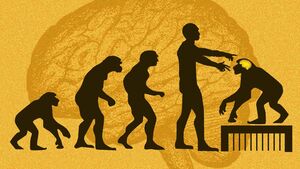by Ralf Stutzki, April 29, 2019

The MIT Technology Review recently reported that "Chinese scientists have put human brain genes in monkeys".1 After reading the article I fell asleep and had the weirdest dream. I dreamt that I was a scientist in a lab, wearing a fancy white coat. In the afternoon I waved good bye to my research group and drove home where my lovely wife who had her day off (she works full-time, we are very liberal) opened the door.
"How was your day today, honey?" she asked and I answered:
"Thank you dear, actually not too good. The darn monkey rejected Aunt Jessica’s Microcephalin gene which I added two weeks ago.“
"You did WHAT? Auntie Jessica’s very own MCPH1 brain gene??! How did you do this? Does she even know?"
"Oh yes, she gave her written informed consent. She had kept the gene in her freezer for some 50 years and said it was time to get rid of some of the old stuff."
"Oh sweetheart, you are sooooo responsible…"
Next thing I knew was that Aunt Jessica kicked down our front door.
And I luckily woke up.
The strangest thing about this dream is that I am not so sure anymore whether this actually was a dream. Reality and dreams can be hard to distinguish, these days. Reading this MIT article was disturbing indeed, but I have to admit: I found it also highly entertaining. To me nothing can be as upsetting and at the same time entertaining as reading articles about certain scientific developments these days. Forget about tabloids! I mean why on earth should we create transgenic macaque monkeys by adding a human brain gene? Just because we are able to do so? Because otherwise the freedom of science would be at stake - basta? Because we want the macaque population to know what it feels like to have an Aunt like Aunty Jessica?
The researchers in charge of this project said they wanted to narrow the evolutionary gap and claimed that the respective human gene had made the monkeys smarter ("the modified monkeys did better on a memory test"). Luckily, they didn’t use my MCPH1 on this one. I constantly forget where I left my reading glasses which I do not even possess, but that’s a different story.
In order to understand the secrets of human intelligence researchers worldwide are searching to identify those genes which make a human uniquely human. The Chinese research team chose Microcephalin for their project but apparently failed to find a Western journal to publish the results. Luckily, countless Western scientific papers and newspapers have reported so extensively about the paper being rejected over here that most likely more people read (about) it than would have been the case if it had been published here. I guess you can call this a fine marketing strategy. At any rate: now it is conveniently easy to find the link to this article which was published recently in the Beijing journal National Science Review.2 And our big wheel of moral outrage is ready to turn.
"Very risky", "reckless", "troubling", "slippery slope" are usually the standard terms used when we mourn the loss of moral values in science. Believe me: each and every word can be found in the MIT article. But before we start throwing our first stone of fine western moral standards towards China let us pause and come to terms with our own role. We might just find out that this whole situation is at least as much about us as it is about anyone else. According to Nature considerable amount of Western based research involving primates due to the legal restrictions in the respective country is carried out in China, where "the opportunities are great".3 And MIT even calls China the "mekka for foreign scientists who need monkeys to experiment on".1 We all know - research with primates is not the only field where national laws and values are ignored for the sake of scientific progress. So, there are good reasons to start the discussion about (moral) laws and good scientific practice right here. And if in the end this means even more regulation - well, then so be it.
Ralf Stutzki
* Shock the Monkey (song by Peter Gabriel)
[2] https://academic.oup.com/nsr/advance-article/doi/10.1093/nsr/nwz043/5420749
[3] https://www.nature.com/news/monkey-kingdom-1.19762

Ralf Stutzki, Head Ethics